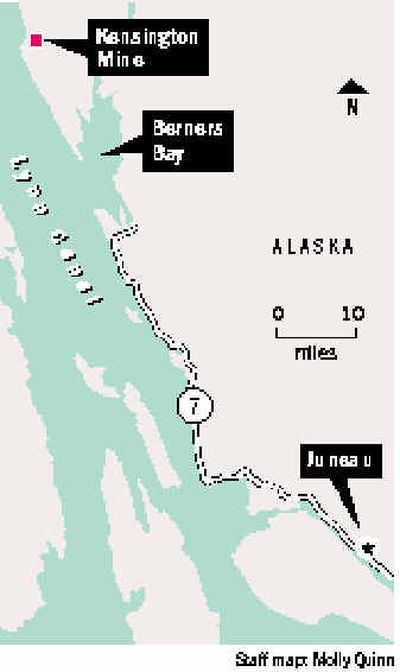CdA Mines land swap blocked

A federal land swap benefiting an Alaska gold mine proposed by Coeur d’Alene Mines Corp. created a fracas last week at the nation’s capital.
Senate Democrats walked out of an Energy Committee hearing to keep the Cape Fox Land Exchange from coming to a vote. While environmentalists hailed the move, the bill’s sponsor – Alaska Sen. Lisa Murkowski – was livid.
The political maneuvering reduced the bill’s chance of passage this year.
“It doesn’t mean the bill is dead for the year, but time is certainly getting tight,” said Chuck Kleeschulte, Murkowski’s communications director.
Coeur d’Alene Mines wants to reopen the Kensington Mine, a historic gold property about 45 air miles north of Juneau. The land swap is part of its plans.
The Kensington mine contains an estimated 1 million ounces of gold, worth more than $400 million at today’s prices. The company is nearing the end of a long permitting process, and could begin the $90 million mine construction project late this year, said Rick Ritchins, Kensington’s project director.
The mine would run 10 years, employing 225 people.
The swap would trade up to 12,000 acres of Tongass National Forest land surrounding the underground mine to two Native American corporations. The corporations would lease the land to Coeur d’Alene Mines for buildings, a tailing pond and a mill. One of the benefits of the land swap would occur after the mine closes, according to Ritchins. The state of Alaska, not the federal government, would become the lead agency on the Kensington’s reclamation.
“It sort of streamlines the administrative process for us,” Ritchins said. However, federal agencies would still have a significant oversight role in the mine’s clean-up, he said
Though the company would benefit from the land swap, it isn’t a deal-breaker, he added. Coeur d’Alene Mines could still operate on the land with additional permits from the state and the Forest Service.
The land swap, meanwhile, has generated skepticism in Juneau. An editorial in The Juneau Empire newspaper suggested that taxpayers were being shortchanged.
“Basically, it’s a land grab, a give away of high value federal land to corporate interests,” said Kat Hall, mining and water quality organizer for the Southeast Alaska Conservation Council.
Cape Fox Corp., one of the Native American corporations involved in the land swap, is proposing to trade heavily logged land for old growth, she noted.
The forest land proposed for trade also lies adjacent to Berners Bay, an ecosystem that supports a myriad of wildlife – from seals and humpback whales to a prolific run of smelt that draws hundreds of bald eagles every spring.
Berners Bay is also a recreation gem for Juneau residents, Hall said, attracting hunters, kayakers and wildlife photographers. If the swap goes through, recreational users would be confronted with “No Trespassing” signs, she said. Other types of development – including clearcuts – also could occur, she said.
Not so, said Ritchins. After a public meeting in Juneau last year, Sen. Murkowski amended the bill to protect recreation access along Berners Bay’s beaches. Limitations were placed on logging to protect the scenic views surrounding the bay.
“There’s a view that any development inside of Berners Bay is going to take away from the natural character of the area,” Ritchins said. “Through the amendments, we’ve tried to limit what development occurs.”
Cape Fox Corp. has no interest in logging near the mine, said Bruce Borup, chief executive officer of the native corporation, which represents the commercial interests of Alaska’s Saxman Tribe.
Though the land targeted for exchange is old growth, it isn’t viable for commercial timber harvest, he said. Low-value hemlock trees represent a large part of the forest, according to the Forest Service. Only a small portion of the higher-value Sitka spruce could be cut.
Cape Fox Corp. wants the land for the lease payments the mine will generate, Borup said. The corporation also envisions potential revenue from its ability to bid on mine contracts.
Borup hopes to see the land swap bill pass this year – if not by Oct. 8, when Congress recesses, then at a special session after the November election.
“We trying to make a transition from being a timber company to a company with diversified business interest,” he said.